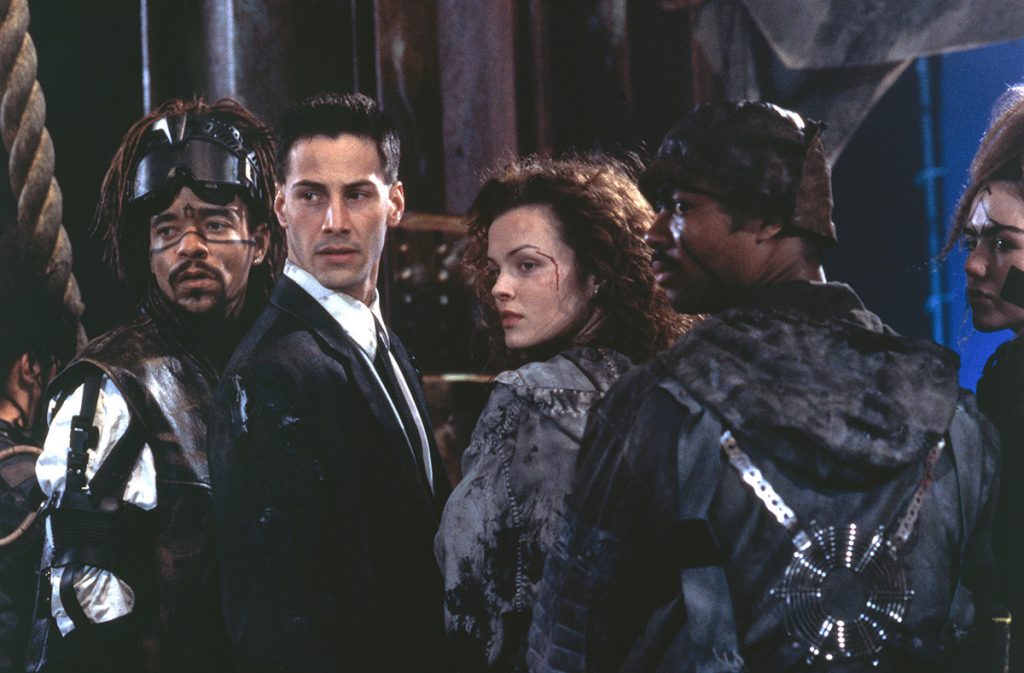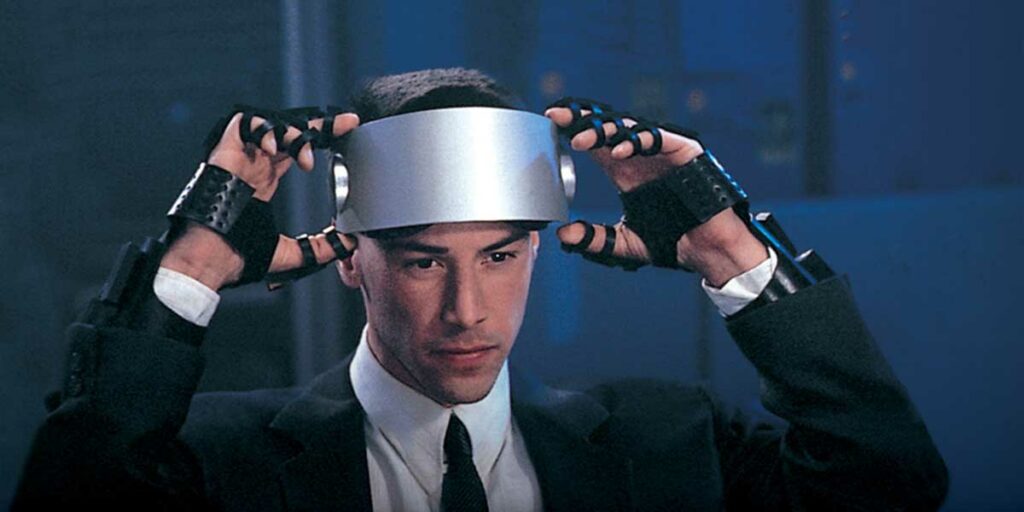Bewildering, nonsensical, and by equal turn genius and downright idiotic, Johnny Mnemonic is a cyberpunk relic you unearth at your own risk.
It’s the dystopian future: the year 2021 (spooky). Johnny (Keanu Reeves) is a courier, a cybernetically enhanced transporter for sensitive data, who overstuffs his brain with documents from a shadowy pharmaceutical giant. Of course, the situation rapidly turns ugly, and Johnny must find a way to get the data out of his head before his brain explodes, all while being hunted by the Yakuza and a beefy cyborg priest. His only allies? A down-on-her-luck bodyguard with a mysterious, apocalyptic virus; Ice-T and his band of anarchists, repeatedly referred to as anti-technology while having a secret base made entirely of computer monitors; also, a hacker dolphin. This is the world of Johnny Mnemonic – a 90-minute simulation of having a panic attack inside a dial-up modem.
Johnny Mnemonic’s future is not Blade Runner’s monsoon-ridden Los Angeles, nor the hedonistic hellscape of Total Recall’s Mars, and yet it is both worlds simultaneously, stripped of nuance and character, parodic and insincere. William Gibson’s name seems to be almost deliberately kept out of Johnny Mnemonic’s frame until the very ending credits, which is somewhat unsurprising. This was a screenplay developed by the father of cyberpunk, a legendary figure in the world of dystopian science fiction, and so Johnny Mnemonic revels in the same themes of anarcho-capitalist self-destruction and east-west hybrid culture.
Sometimes, Gibson’s influence rears its head as impressive prescience (Johnny’s brain has a capacity of 80GB, which admittedly seems a little low with hindsight but is at least in the right order of magnitude), and sometimes it feels cast aside in favour of bombastic set-pieces and eccentric one-note side characters. The end result is a plot that bloats at every seam with ideas that could, perhaps, be the very first inklings of truly fascinating philosophical fiction, and yet are immediately drowned out by shouts of, “Look! It’s Ice-T! And he’s brought a crossbow!”
So, the plot isn’t much to speak of. Neither, in honesty, is the acting – for a cast that positively reeks of “wow, they’re in this?”, it’s incredible how much of the dialogue is delivered with a middle-distance stare, occasionally punctuated by an angry sigh in order to keep things moving. This is all well and good when the screenplay keeps some semblance of self-awareness, sticking to well-worn B-movie dialogue that, even by 1995, had been done to absolute death (roughly half of the lines said by either Keanu Reeves or Dina Mayer in this film could happily be replaced by “woah, slow down, English please”), but when the movie begins to dream up its delusions of grandeur, it falls back to Earth almost instantaneously. Johnny’s famous non-sequitur of a pro-luxury rant halfway through the film is a particular point of pleasure for the ‘so bad it’s good’ crowd, as he stands atop a pile of garbage screaming about room service and laundered shirts. Self-respecting trash is always welcome – trash masquerading as moral fable is exhausting and somewhat sad.

It’s these detours into moral fable that remove the possibility of this movie being considered a beautiful disaster. It both invites and quickly rebukes you for searching for any deeper analysis beyond blasting lights directly at the back of your brain: we are asked to ponder the morality of a for-profit medical industry, or the self-destructive nature of technological excess, before being suddenly whapped across the face by a virtual reality sequence straight out of a Community episode. Nowhere is this more obvious than in Dolph Lundgren’s (Dolph Lundgren, for Christ’s sake) half-robot street preacher – a character that seemingly aims to represent the very briefest and most superficial of theological issues in dystopian fiction, before emerging once again at the end of the film shouting “Jesus time!”.
With all this said, I don’t feel as though I can fully write this movie off. For all its myriad flaws, I found myself thoroughly entertained, even if I had forgotten nine-tenths of the film by the time the credits had finished rolling. How is it possible to truly despise a movie whose plot could be rendered completely and immediately redundant with a zip file? How can you even dare to ponder the philosophy of a movie that features, once again, a hacker dolphin that zaps Keanu Reeves with a satellite dish for calling it a fish? Johnny Mnemonic’s place in the halls of ‘so bad it’s good’ cinema is unwarranted. Its bad and its good are separable, unrelated; it succeeds at some aspects, it fails at many others, but its rare glories are in spite of, not due to its failures. Do these achievements outweigh its failings enough to make this a fossil worth dusting off for this re-release? I’m inclined to say no – go watch Total Recall instead, and let this lofty-sighted disaster die.
To support the film’s 25th anniversary, Johnny Mnemonic will be released on Digital HD by Vertigo Releasing on 10th May 2021.

